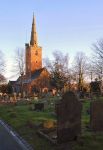Halesowen (/heɪlzˈoʊ.ɪn/ haylz-OH-in) is a market town in the Metropolitan Borough of Dudley, in the county of West Midlands, England. It is considered one of the largest towns in the United Kingdom without a railway station.
Historically an exclave of Shropshire and, from 1844, in Worcestershire, the town is around 7 miles (11 km) from Birmingham city centre, and 6 miles (10 km) from Dudley town centre. The population of the town, as measured by the United Kingdom Census 2011, was 58,135. Halesowen is included in the Halesowen and Rowley Regis constituency which is held by the Conservative James Morris.
History
Halesowen is recorded in the Domesday Book of 1086 as being larger than Birmingham. The manor and town was known as Hala (from the Anglo-Saxon word "halh", meaning nook or remote valley), until it was gifted by King Henry II to Welsh Prince Dafydd ab Owain and became known as Halas Owen. The parish of Halesowen, which incorporated other townships later to become independent parishes, was an exclave of the county of Shropshire, but grew to become a town and was transferred to the jurisdiction of Worcestershire by the Counties (Detached Parts) Act 1844. Included in the boundaries was the ancient village of Brettle.
In the 1220s, Halesowen had a market and fair and, by 1270, it had been granted a charter of liberties by its lord, the Premonstratensian Abbey of Halesowen. By 1300, it is estimated that the population was around 600. The court rolls for Halesowen survive from 1272 and show that the majority of migrants to Halesowen in the 14th century were women at 75%. Little was done to remove them and many went on to become small retailers in the area.
The village is well known by medieval historians for the conflict that took place around this time. In 1279, as the Abbot attempted to increase labour services for his tenants (which had been fixed in 1244), the peasants attempted to plead their case in the King's Court, a privilege forbidden to unfree vi
